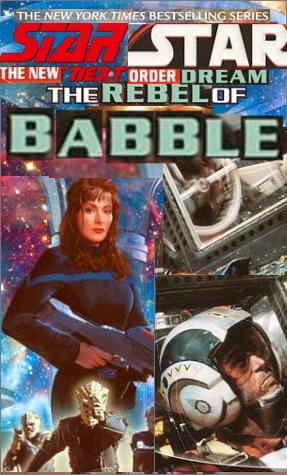 |
|
Good thing I'm under the radar of the bigwigs, lest Seven Savage Lawyers from Beverly Hills be sent to pick the flesh from my bones. |
|
|
|
The Agony Column for March 21, 2001
Commentary by Rick Kleffel
There's a tendency and a reason to think that science fiction is sort of "samey". Yeah, yeah, yeah, you got your apocalypse, now what do you want? Spaceships -- we got 'em. Aliens -- next aisle up, on the right. We're clearing out all the cyberpunk this week -- you want to jack in? Now, in TV and movie series based fiction, we've got a whole range of shiny covers for your reading pleasure. The best thing is that since they're all based on TV shows and movies you've already seen many times, hell, you don't even have to read them! Now they're not on sale, they're on the display rack up front, right next to the register.
 |
|
Good thing I'm under the radar of the bigwigs, lest Seven Savage Lawyers from Beverly Hills be sent to pick the flesh from my bones. |
It's the kind of thing that put me off science fiction many years ago. In the past ten years, I've slowly come back to the teat, with a little help from my friends who said, "Rick, you ought to read this book I got at the grocery store!" That book turned out to be 'The Reality Dysfunction'. So you have to be careful what you're on a hair trigger to diss.
 |
|
Not easily identifiable as one of the best SF novels of the 90's is it? And I first saw it in a Safeway! |
Today's roundup of recently reviewed science fiction gets something in from all corners of the science fiction globe. Please note that I operate on my own review schedule. Some of these books are brand-new, and some and a bit older. I'll tilt first towards the big guys. The top of the US SF heap is clearly Tor books. They've got the clout, the standees, and a lot of big name authors. To my mind, one of their best authors is Robert Charles Wilson. Here is a guy who has clearly paid his dues, churning great novels for what -- 16 years. But his recent run of novels -- 'Darwinia', 'Bios' and his latest 'The Chronoliths' -- has been something special. Though Wilson is certainly a science fiction writer, his novels have a very nice and definite vibe of supernatural horror. There's always a good bit of terror mixed in with the awe that Wilson inspires. 'Darwinia' was positively Lovecraftian in its evocation of a Europe suddenly overrun by a primeval forest filled with monsters. In 'Bios', he created a planet that was toxic in every way to human life. It was a daring move and made a lot of sense. We'd seen umpteen planets where dangerous monsters roamed, where humans stopped to smell the roses, but Wilson's Isis is a unique creation, a planetary hot zone.
 |
 |
 |
|
'Darwinia' combines elements of Lovecraft and Philip K. Dick in a unique 'alternate history' style novel. |
'Bios' tells the story of a planetary 'hot zone' hostile to all human life. |
In the wake of current events, 'The Chronoliths' seems even more poingant and prescient. |
For all Wilson's creative and horrific imagination, it's his carefully composed characters that really get the reader hooked. Guilford Law is the perfect archetypal explorer of 'Darwinia'. But his family is also rendered with a nice precision that rounds out the wonder and awe he experiences in his travels. 'Bios' ends on such a wistful and melancholic note that it takes the novel to a level not usually reached by a novel filled with horrific monsters. And in 'The Chronoliths', damaged Scott Warden cannot escape the slip of responsibility that costs him his family. And while I'm giving credit where credit is due, I must say that as books, the Wilson novels are also a cut above. The packaging is universally very nice, and since they're all rather short, the print size and page count are generous. They're a reliably enjoyable reading experience.
 |
|
Howard V. Nedrix offers a fascinating Apocalypse followed by a guided tour of the ruins in 'empty cities of the full moon'. Every time I type that title I tilt towards the old song by Cream. |
Another big guy out there is Ace. I've been reading Ace Science fiction since before we were on the moon. Howard V. Hendrix is the author of the lovely hardcover release of 'empty cities of the full moon'. It's only his fourth novel, and to my mind, there are still a few kinks in his execution. 'empty cities of the full moon' gives the parallel stories of the Collapse of Civilization As We Know It in 2032 (you got your apocalypse here), and the first chance at some reconciliation 33 years later. Like Wilson, Hendrix is not afraid to throw in some aspects of supernatural horror into his science fiction. It helps. Hendrix's apocalypse is the result of a global plague that raises consciousness even as it kills millions. He writes a gripping apocalypse. The pages can't turn fast enough, and he seems possessed with a powerful creative imagination. In contrast, the segments set in the post-apocalypse world suffer. The world itself is every bit as fascinating as the fall. Hendrix peoples it with shapeshifting mutants, immortal rich-asses, and mysterious merfolk. You get some voodoo thoughts thrown in, a great re-take on shamanism, and a conceptually fascinating use for nanotech. But the new characters introduced in the post-fall world aren't quite as compelling as those in the earlier segments (a fair number survive the fall), and the plot seems to get a bit caught up in tourism as opposed to the taught, terrifying end of the world. Yes, the New World that Hendrix shows us is fabulous. But we'd probably want the abbreviated tour. Still, 'empty cities of the full moon' goes a lot of places that are very interesting and does so in style. Hendrix's prose is rather nice when he's inspired, which is most of the time. And finally, Ace has put together a wonderful package here, a nice cover and a nicely sized book that won't annihilate your eyes when you try to read it.
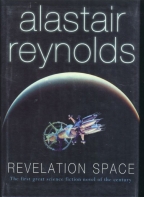 |
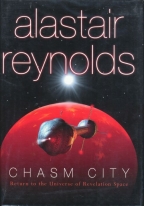 |
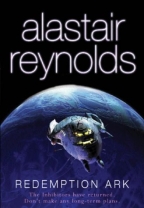 |
|
I took a chance on this book two years ago and it was the best money I ever spent. |
'Chasm City' combines elements of mystery with a radically beautiful SF vision, but is not a direct sequel to 'Revelation Space'. |
'Redemption Ark' is the sequel that 'Revelation Space' requires. Look for it in April in the UK. |
Of course Ace also has Alastair Reynolds on tap, and if you didn't snatch the UK hardcover of 'Chasm City' last year, you'd be well advised to pony up for the Ace version. Yes, it's a few months late, but who could worry when you're getting one the SF's top authors. The package may be typical, but the contents are exceptional. Reynolds is in a class well beyond most SF writers. 'Chasm City' is set in the same universe as 'Revelation Space', but it is not a direct sequel. Rather, it takes detour into one of the more interesting crannies that Reynolds created, the titular 'Chasm City' and plunges the reader into the depths of a hellish experience that will rip you brain asunder. But this is a good kind of ripping, trust me. This is the kind of rip, tear, and destroy that SF readers wait years for. 'Chasm City' is a detective story of identity and terror. Told in the same gothic detail that made 'Revelation Space' live up to its title, it offers two parallel stories. In one revered space hero Sky Haussman finds himself in infamy; in another, Tanner Mirabel seeks to kill the man who murdered the woman in his care. As the stories wind together, Reynolds plunges into one of the most memorable locales ever created by a science fiction writer. Wild, gothic science fiction can simultaneously be high literature. 'Chasm City' makes that happen in this reality. If you haven't yet read Reynolds, make a point of doing so immediately. You'll be lining up for his next novel, 'Redemption Ark', which is a direct sequel to 'Revelation Space', and should be available in the UK in April.
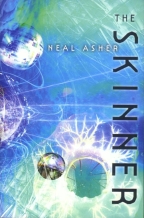 |
|
Neal Asher's latest novel is a follow-up to a short story in 'The Engineer', set on the planet Spatterjay. Violence, gore, horror, monsters, science fiction -- what more can you ask for? |
A British writer who has not yet made the trip across the Atlantic is Neal Asher. You'll have too look about on one of the web search engines to find his first two works, the garishly illustrated 'Parasite' and the follow-up collection 'The Engineer'. You'd be well advised to seek them out, as they set up his 'Runcible Universe', and will give you an idea of how he operates. Which is, not to put too fine a point upon it, like a bull in a china shop. The Runcible universe isn't your typical SF creation. It's dangerous at all points and places. Runcibles are teleportation portals that usually work. And if they don't work, then perhaps some parts of the closest city will emerge from under the debris. Of course, the cities are on planets that are very hostile to human life. It's not a happy universe of peaceful coexistence. And those Runcible portals have to be hauled to the planets on starships, then assembled on the planet -- again, not as easily as these things usually are done in SF.
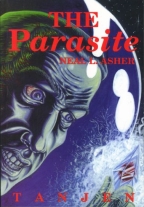 |
|
Yikes! Someone spliced the DNA of Robert Heinlein and Robert E. Howard and look what grew up the petri dish! |
'Parasite' is his debut from the immortal Tanjen Press (the folks who brought you Tim Lebbon). The cover illo should give an idea of what zone Asher's operating in -- crude, scary and just a bit out of control. But Asher will surprise you with some interesting meditations on what it means to be human, and he keeps the firepower at a high enough volume to drown out any complaints.
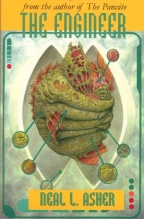 |
|
This collection includes the title novella and six short stories from "the master of science fiction horror". |
'The Engineer' is a collection consisting of novella and six short stories. The titular novella is fascinating meditation on the difference between gods and mere beings, set forth when a starship discovers a frozen alien of godlike power. A relative of this creature shows up in 'Gridlinked', his first full-length novel published by a major publisher. And we first meet the trans-human creature that lends its name to 'The Skinner', Asher's newest novel, in the short story 'Spatterjay'. The planet Spatterjay is particularly dangerous even in Asher's universe.
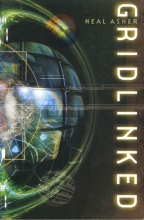 |
|
The classy cyber cover conceals another round of butt-kicking. fast reading fun enlivened by an imaginative vision. |
'Gridlinked' (which I've actually read; 'The Skinner' should arrive in the mail any day now) shows Asher beginning to flex his fists. It's violent, a bit crude and very exciting. It's also drolly humorous. If you can imagine a steroid-pumped James Bond pursuing human and trans-human creatures across a poisonous, hazard-ridden universe you're starting to get the picture. Asher has a unique voice -- loud. There's a bit of subtlety in his humor, his imagination and his quirky characters, but you'll be hard pressed to register it in the face of all his hideous horror and violence. If you like very loud punk rock music and science fiction, then Asher is definitely your man -- don't wait, find it and buy it all. And even if you like neither, you're might find yourself having a grudging admiration for his forceful writing style. Like Robert E. Howard, one expects that he probably shouts the prose as he types it. He certainly writes at 11.
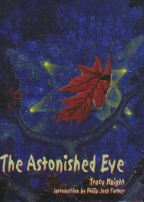 |
|
Tracy Knight positive plot turns run counter to those of every other gloomy gus mentioned in this column. It's a wonderful book. |
But you don't need to write at 11 to catch the reader's ear. In 'The Astonished Eye', Tracy Knight does a very nice Twilight Zone piece of science fiction fantasy. In complete contrast to everything else I've written about, this novel attempts and succeeds at something much harder. 'The Astonished Eye' is about a failed journalist, working for a tabloid, who comes back to his home town to pursue a story that may very well secure his career -- a crashed UFO. Knight does the small town thing to a tee, and his imagination is more than up to some interesting twists on the gentle themes he spinning. Not that he's beyond putting in elements of horror in his novel. It's just that he's that oddball, genuinely nice writer who likes his characters and treats them well. Not many writers, science fiction or otherwise can handle a nice story and keep it strongly plotted. Knight can and does. I'll be blunt, there's a real Bradbury vibe to this novel, and that's a very good thing.
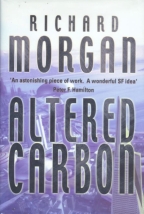 |
|
I demand that you buy this book immediately, because you will love the combination of Peter Hamilton and James Elroy. Neal Asher fans will like it, most breathing humans will like it, as long as they can take the violence and gore. |
OK, I'm not done with this book yet, but I can tell readers right now that they should be seeking multiple copies from their favorite internet dealers. That novel would 'Altered Carbon' by Richard Morgan. Like Neal Asher, Morgan is a violent guy, and his universe is the Star Trek universe if it had been written in collaboration with James Elroy. 'Altered Carbon' has all the hallmarks of classic mysteries, and a creamy ultra-violent science fiction feel. Morgan gets both the SF and mytery genres just perfectly right. This is hard boiled hard science fiction. It's not dry, it doesn't lecture. It shoots first, vaporizes the head, and never asks questions. Be prepared to forgo the usual social interactions when you start this one.
'Altered Carbon', 'Grindlinked', 'Chasm City', 'The Astonished Eye', 'empty cities of the full moon', 'The Chronoliths' -- they're all the kind of books that could easily show up on your grocery store bookshelf, or even in the MegaMultiMonolithic Bookshop, Café, Army Recruitment Center and DVD Rental Store, right next to the umpteen-and-first 'Star [put your favorite series closer here]' book. Not so long ago I would have rolled my eyes at them as well. It's easy to diss and it's easy to miss. I've done my share.
Thanks,
Rick Kleffel